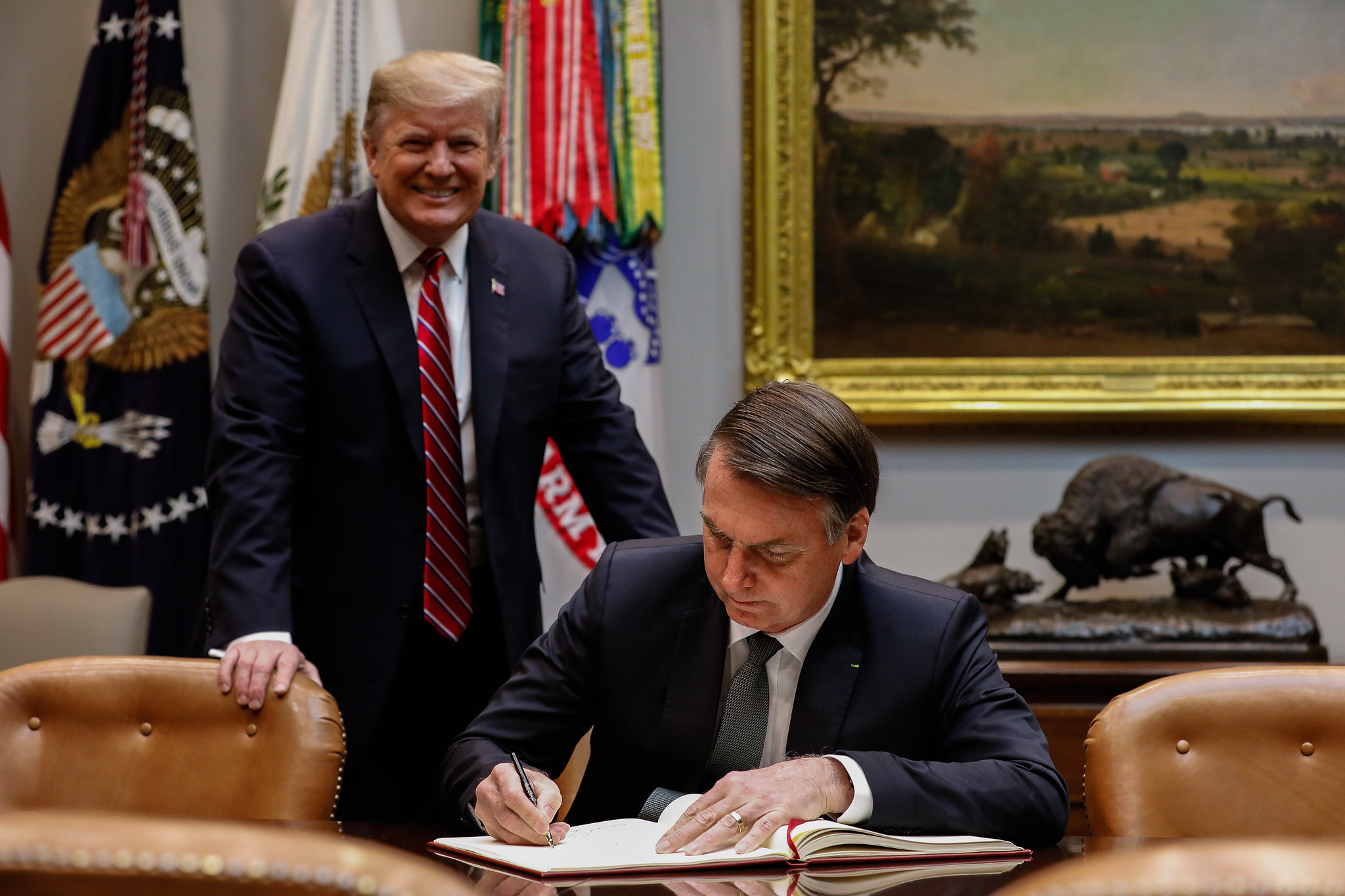Brazil’s pushback undermines Trump’s trade rhetoric
Thiago Sussekind, Master of Public Policy student, examines recent US tariff threats against Brazil, exploring their political motivations, legal weaknesses and the wider implications for democracy and international trade.

A political tariff
On 9 July, Donald Trump announced plans to levy a 50% tariff on Brazilian exports to the United States. Unusally, he did so via a public letter to President Lula, posted on Truth Social – bypassing conventional diplomatic channels. Instead of offering an economic rationale, the US president cited the prosecution of former president of Brazil, Jair Bolsonaro, as the chief trigger.
The far-right politician is charged over his alleged role in a coup attempt that followed his defeat in the 2022 presidential election – a result he refused to accept. Trump devoted a few paragraphs to economics, advancing one motive. He framed the tariff as a necessary response to Brazilian policies and trade barriers ‘causing unsustainable Trade Deficits against the United States’.
Yet America has run a trade surplus with Brazil for 16 years. In 2024, the US surplus in goods was US$7.4 billion; including services, it rose to US$28.6 billion – making Brazil the third-largest contributor to the US global surplus. It soon became clear that Trump had copy-and-pasted language from other letters, leaving his lone economic argument flimsy.
Legally, the new tariffs appear baseless under US law. They are not being imposed because of market disruption (Section 201), national security (Section 232) or unfair practices (Section 301). Nor are they anti-dumping duties or a response to an international economic emergency. Trump’s real motive, set out in his own letter, is to interfere in the domestic affairs of a sovereign country and long-time partner.
Democracy under siege
The Brazilian executive cannot ‘negotiate’ over Bolsonaro’s prosecution. Trump claims Lula is conducting a ‘witch hunt that should end IMMEDIATELY!’, ignoring the separation of powers that Brazil’s democracy – one of the largest in the world –enshrines.
International audiences may be less familiar with the charges. On 8 January 2023, – mirroring Trump’s actions on 6 January 2021 – Bolsonaro he refused to concede defeat and his supporters stormed Brazil’s Congress, Supreme Court and the Planalto presidential palace, following months of unrest encouraged by his administration. Protesters set up camps outside several Armed Forces headquarters, urging intervention to halt the transfer of power – encampments that lasted months and ultimately supplied the mob that stormed the official buildings in January. Before that, demonstrators had blocked highways nationwide to demand a self-coup.
Democracy was under siege. Federal Police managed to stop a bombing attempt at Brasília’s international airport, aimed at provoking a crisis that would justify the presidency’s adoption of ‘extraordinary measures’ – in hopes of enabling the self-coup.
Bolsonaro’s own participation has been detailed by the Federal Police and the Federal Prosecution Service – both autonomous institutions. The heads of the Army and the Air Force have confirmed a December 2022 meeting, first described by a former Bolsonaro aide turned state witness, in which they were formally invited to support an unconstitutional and illegal plan that would grant the President extraordinary powers to annul the election result. The Federal Police corroborated the meeting by placing all participants inside the palace through building-entry logs.
The case contains other grim illustrations of the climate inside the presidential palace after the 2022 election. Army General Mário Fernandes, executive secretary to the Secretary-General of the Presidency, admitted in court that he wrote a plan to kill Lula, his vice-president and Alexandre de Moraes, a Supreme Court justice and Bolsonaro’s nemesis. The plan was printed inside the palace and is believed to have been discussed by government officials.
In a CNN interview with Christiane Amanpour, Lula said that Trump could have been charged over the Capitol invasion had he done it in Brazil – that is true. Not only is Brazil a well-functioning democracy capable of trying former presidents for their wrongdoing, but our Penal Code imposes harsh penalties for attempting a coup. His words inciting thousands of angry supporters – including ‘[y]ou’ll never take back your country with weakness’ – were grave enough to warrant prosecution. US institutions should be learning from Brazilian democracy, not undermining it precisely because it is preserving itself.
A multipolar world pushes back
With that ship long sailed, Americans are now scrambling to find an economic rationale for tariffs imposed for purely ideological reasons. The US Trade Representative has opened a Section 301 investigation to ‘hold Brazil accountable for its unfair trading practices and ensure U.S. companies are treated fairly’. It cites deforestation in the Amazon – curbed by the current administration – Brazil’s data-protection law, and a government-developed electronic payments system – hailed by Nobel laureate Paul Krugman as ‘the future of money’.
Brazil, a long-time democratic partner of Washington, is being bullied to benefit America at the expense of its own innovations. Unlike the ‘Big Stick’ era, there is no ‘talk softly’ with Trump; only the stick. More recently, reports have surfaced of American negotiators trying to secure a deal to exploit rare-earth minerals in Brazil. It feels as if we have slipped back into the nineteenth century.
But the world is not what it was. Despite Trump’s dreams of domination, we live in a multipolar planet. Brazilian exports to the US are less than 2% of national GDP; the economy is too large to be bullied into abandoning democracy. In fact, the tariff threats may achieve the opposite of their intended effect. Rather than forcing Brazil into submission, they have galvanised national resistance and exposed the risks of over-reliance on an erratic partner. They also push away the most flourishing democracy within BRICS – one that has consistently tried to steer the group in a direction that does not antagonise Western interests in its long pursuit of mediation between North and South.
The deadline for the tariffs to take effect is 1 August. With so little room for negotiation and the threat rooted in falsehoods and an authoritarian mindset, there is scant cause for optimism. But Brazil’s democracy and sovereignty will once again stand the test of time and emerge stronger.

